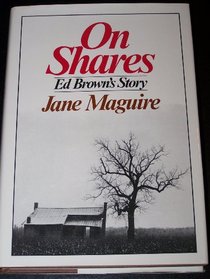This is from the inside flap: "The extraordinary, miserable, sometimes colorful, always challenging life of a black sharecropper during the pre-World War I and earlier pre-New Deal year is told in his own words. The reader is "there" as a very young Ed Brown becomes the fastest cotton picker on "his" and neighboring farms in the midst of a very cruel world, which is from time to time relieved by some very human laughter. One shares with Ed the life of a defenseless boy in a manmade "frontier" society, gets to know the bosses, friends, animals and some very dangerous enemies. And with the passing of time, the reader experiences Ed's realization of a "modern" slavery. " The first lynchin I knowed of I was nine years old. Hearin the shootin brung a funny feelin. You sort of drawed up like you was dodgin it."
After arguing with his step daddy he left: " I was twelve, it was the last day I was ever a boy at home." His mother had said, " If the white people would forget my color and I could forget slavery we could all the Christians together. Course, you'll do a lot of sinnin but it's better to belong to the church." Years later his doctor said, "Don't be so good the Lord will covet you. Don't be bad enough the devil will get you. Be sort of twist and between, so don't nare one of them want you." Throughout his troubles--his struggle to support his family, his wife's mental breakdown, his daughter's trial for murder, and the drying up of his farm community--there is always the realization of human dignity,: "A man's a man for a' that."
After arguing with his step daddy he left: " I was twelve, it was the last day I was ever a boy at home." His mother had said, " If the white people would forget my color and I could forget slavery we could all the Christians together. Course, you'll do a lot of sinnin but it's better to belong to the church." Years later his doctor said, "Don't be so good the Lord will covet you. Don't be bad enough the devil will get you. Be sort of twist and between, so don't nare one of them want you." Throughout his troubles--his struggle to support his family, his wife's mental breakdown, his daughter's trial for murder, and the drying up of his farm community--there is always the realization of human dignity,: "A man's a man for a' that."




